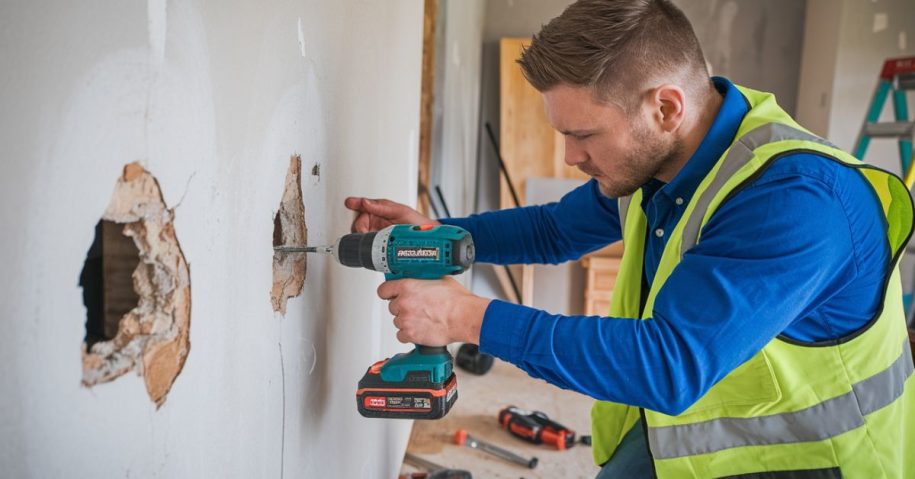Handyman Jobs: A Practical Guide for Aspiring Workers in America
Handyman Jobs are a popular and essential career path for people who enjoy working with their hands and fixing things. From small home repairs to larger maintenance projects, handymen play a critical role in keeping homes and businesses running smoothly. If you’re considering a career in handyman services, this article will walk you through what the job involves, the skills you’ll need, and how to get started. Whether you’re looking to go full-time or offer your services as a side gig, handyman jobs can provide flexibility and steady income.
What Is a Handyman Job?
A handyman is a skilled worker who handles a wide variety of tasks related to repair, maintenance, and home improvement. Handyman jobs can include everything from fixing leaky faucets, patching walls, assembling furniture, repairing appliances, painting rooms, installing light fixtures, and even small carpentry projects. The tasks can vary from job to job, depending on the customer’s needs.
Handymen are often hired by homeowners, renters, landlords, property managers, and even small businesses. The beauty of being a handyman is that no two days are the same. One day, you might be repairing a broken door, and the next, you could be installing new shelves or fixing electrical outlets. It’s a job for people who enjoy variety and like solving problems.
Why Choose a Handyman Job?
Choosing a handyman career has many benefits. Here are some reasons why more Americans are turning to this field:
- Flexibility: One of the biggest perks of handyman work is the flexibility it offers. You can choose to work full-time or part-time, and you often have the freedom to set your own hours. Many handymen operate their own businesses, allowing them to decide when and where they work.
- Independence: As a handyman, you can be your own boss. Whether you run a solo operation or manage a small team, you have control over the type of jobs you take and the rates you charge.
- Steady Demand: There will always be a need for home repairs and maintenance. People often don’t have the time or skills to handle these tasks themselves, so they turn to professionals. This means there is a steady demand for handyman services, especially in residential areas.
- Variety of Work: If you don’t like the idea of doing the same thing every day, handyman jobs are perfect. Each job is different, and you’ll have the opportunity to work on various projects that require different skills.
- Satisfaction: There’s a real sense of accomplishment in fixing something and seeing the results of your hard work. Handymen help solve people’s problems, and many enjoy the satisfaction of completing tasks that make customers’ lives easier.
Common Handyman Services
Handyman jobs cover a wide range of tasks, and the type of work you do will depend on your skills and what your clients need. Here are some of the most common services handymen provide:
- Plumbing Repairs: Fixing leaky faucets, replacing pipes, or unclogging drains are some of the plumbing tasks that handymen frequently handle.
- Electrical Work: While handymen usually don’t do major electrical repairs, they often install light fixtures, replace switches, or troubleshoot minor electrical issues.
- Carpentry: Many handymen take on small carpentry projects like building shelves, repairing cabinets, or framing walls.
- Painting: Whether it’s touching up paint on walls or repainting an entire room, painting is a popular service handymen provide.
- Home Maintenance: Routine maintenance like gutter cleaning, pressure washing, and deck repairs are often part of a handyman’s services.
- Appliance Repairs: Handymen are often called to fix or install appliances like dishwashers, washers, dryers, and microwaves.
- Furniture Assembly: Many people hire handymen to assemble furniture, especially when dealing with complicated pieces from stores like IKEA.
- Outdoor Work: Some handymen handle tasks like fixing fences, installing outdoor lights, or repairing decks and patios.
Skills Needed to Succeed as a Handyman
Being a successful handyman requires a variety of skills. While some tasks are simple and can be learned quickly, others require more specialized knowledge. Here are the key skills you’ll need:
- Problem-Solving: Every job is different, and sometimes things don’t go as planned. You need to be able to think on your feet and come up with solutions to problems as they arise.
- Basic Knowledge of Home Systems: Understanding how plumbing, electrical, and HVAC systems work is important, even if you’re not an expert in these areas. This knowledge helps you diagnose problems and know when to refer clients to specialists for bigger repairs.
- Carpentry Skills: Many handyman jobs involve working with wood, so having basic carpentry skills is essential. Whether it’s building, repairing, or installing, being handy with tools is a big part of the job.
- Attention to Detail: Clients expect high-quality work, and that requires being detail-oriented. A good handyman takes pride in doing the job right the first time.
- Customer Service: Being polite, professional, and responsive is key to building a good reputation and getting repeat business. Many handyman jobs come from referrals, so delivering excellent customer service is important.
How to Start a Career as a Handyman
Starting a handyman career is relatively straightforward, but there are a few steps you should take to set yourself up for success.
- Learn the Basics: If you don’t have much experience, start by learning basic repair and maintenance skills. You can find free resources online, attend workshops, or shadow an experienced handyman to gain hands-on experience.
- Get the Right Tools: Investing in a set of reliable tools is essential for a handyman. Start with the basics—like screwdrivers, hammers, pliers, a drill, and a level—and expand your toolkit as you take on more jobs.
- Consider Licensing and Insurance: Some states or localities may require a handyman license, especially if you plan to offer specialized services like electrical work or plumbing. Having insurance is also important in case of accidents or damages while on the job.
- Market Yourself: Once you’re ready to start, spread the word! Create business cards, build a website, and advertise your services on social media or through local online platforms like Craigslist or Facebook Marketplace. Many handymen also find work through word-of-mouth referrals, so make sure to let friends, family, and neighbors know about your services.
- Set Fair Prices: Research what other handymen in your area charge and set your rates accordingly. You can offer an hourly rate or a flat fee, depending on the type of job.
Conclusion
Handyman jobs offer a flexible and rewarding career for people who enjoy working with their hands and solving problems. Whether you’re looking for full-time work or a side gig, there’s always a need for skilled workers to fix, repair, and maintain homes and businesses. With the right skills, tools, and a strong work ethic, you can build a successful handyman business and enjoy a career filled with variety and satisfaction.
If you’re ready to put your skills to work and help others with their home repairs, a handyman job might be the perfect fit for you.
Also Check: Pharmaceutical Sales Jobs
Follow us: Facebook

















